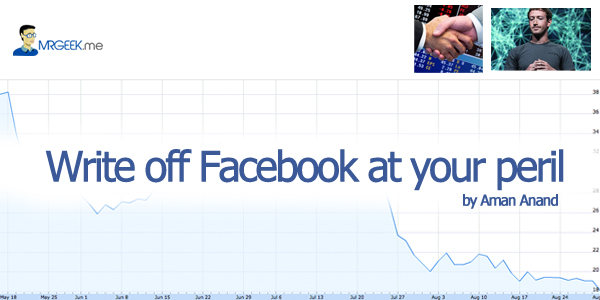To what extent does a company’s valuation reflect its financial health? As with most things, perception trumps everything else. Inflated expectations, particularly in relation to tech companies, have wreaked havoc on the stock market since the turn of the century. This year alone has seen the values of Zynga, Groupon and Facebook fall considerably since they floated on the stock market.
It is Facebook though, which continues to dominate headlines. Whether it involves founding members like Peter Thiel dumping over $1 billion worth of shares or news of a fifth consecutive quarter of declining growth, the company has seen its stock fall at an alarming rate ever since it held its IPO on May 18, 2012. Bearish investors are circling Facebook like a pack of ravenous vultures, with some predicting a target price of $5 and calling for the resignation of Mark Zuckerburg.
Returning to our initial question, how can we best gauge Facebook’s ability to monetise its vast customer base? Those who are convinced the company is still overpriced, despite it losing almost half its value at the time of writing this article, suggest that its clientele are unlikely to generate enough revenue to justify their initial valuation of being worth $108 billion; they have drawn comparisons with the dot-com bubble.
Yet this fails to account for the fact that Facebook has become one of the most dynamic means for people to remain in touch with one another. I was at a wedding this weekend; thanks to Facebook, within hours of each event, photos were posted from the event as friends and family from around the world who were unable to attend this event were able to witness different aspects of it in a new and exciting way. This, in itself, is not enough to justify a hundred billion dollar plus valuation for the company, but the example is intended to demonstrate that advertising isn’t the only service from which Facebook can generate revenue.
In recent days, there have been suggestions that Facebook might launch a VoIP service to rival Skype and bring in at least $800 million a year, with speculation that the company could eventually make significant inroads into mobile operators’ business models. With Facebook being the prime location for people to share details of their lives with friends and family, there is no reason why Facebook would not try and absorb different methods of communication into their business model. There is a strong argument to be made that in ten years time, the company’s main source of income may not be advertising.
While the company is surrounded by controversy, much of which is of its own making, many investors are writing off Facebook too soon. I would argue that it is certain investors’ inability to think beyond Facebook’s current revenue model that is damaging the company’s stock price. Frenzied speculation has dampened expectations in the company’s long term prospects to such an extent, that its fortunes seem irreversible. I would argue that companies like Facebook may yet surprise many of their doubters.
About Aman Anand
Aman Anand studied English Literature at UCL. He writes literary fiction, his debut novel is titled 2032. You can buy his book on Amazon at: http://amzn.to/OJCvU1












